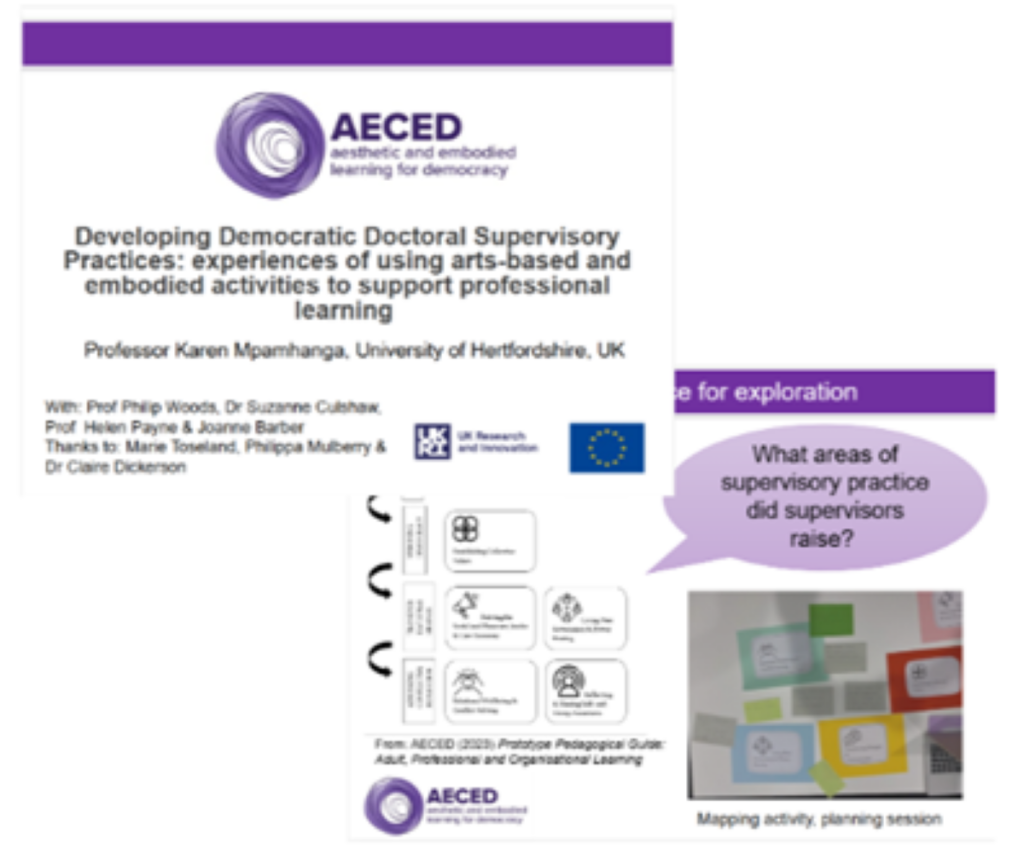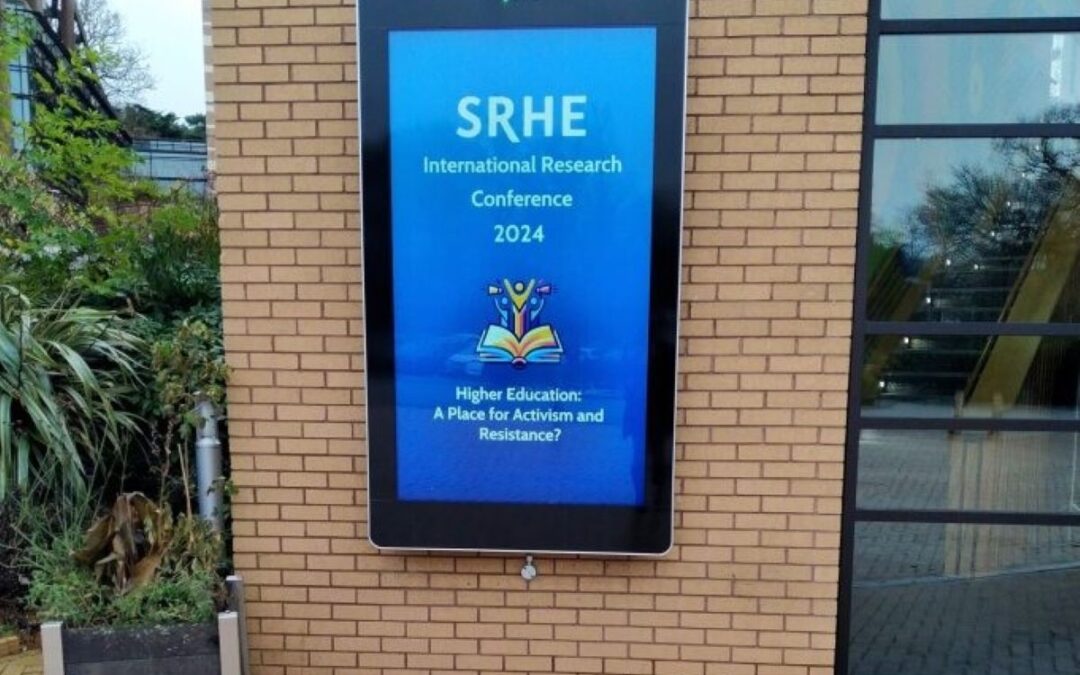On a wet and rather windy Wednesday in December, I set off to Nottingham in the UK to attend the Society for Research into Higher Education (SRHE) conference. I have been a member of SRHE (https://srhe.ac.uk/) for many years, and have attended many annual conferences in the past, but this was my first in-person SRHE conference since Covid, and my first visit to the East Midlands Conference Centre.
Sharing insights from the AECED project
One of my reasons for attending the SRHE conference was to share some preliminary findings from the UK’s Professional Learning case, within the AECED project. This UK case is focussed on the development of more democratic approaches to doctoral supervision and supervisory relationships, drawing on arts-based and embodied approaches to support reflection and foster professional learning. The case has involved working with four groups of UK-based doctoral supervisors, via two distinct approaches: professional learning through facilitated sessions, and professional learning through a self-directed approach.
For the conference presentation, I focussed on initial findings from the facilitated sessions. I shared an overview of how, through the case, we had worked with doctoral supervisors to introduce the projects; familiarise participants with key AECED documents, including the Pedagogic Framework and Guide to Practice; collectively plan an arts-based and embodied professional learning activity to foster reflection on supervisory practices; trial that activity and share experiences; and finally reflect and evaluate the experience through a collage and gesture-activity session.
I provided an overview of the areas of supervision that supervisors wanted to focus on, including working with international students, power dynamics, wellbeing, tensions between primary and secondary supervisors, timely completion, working with regulatory systems, communication breakdowns, and conflict resolutions, and also the arts-based and embodied approaches to learning for democracy that the supervisors were interested in working with.
Creative methods and space for exploration
In the presentation, I shared the experiences of the trials within the facilitated sessions. Through the trialling, the supervisors engaged with a range of creative arts-based and embodied activities, including collage, found objects and images, model making, crafting, and comic-strip making. Each trial included space to discuss the artefacts created in relation to supervision and the development of supervisory practices. The discussions throughout the different phases of the case provided insight into the experiences of doctoral supervisors, and the challenges faced when seeking to engage with research students more democratically, alongside reflections around engagement in arts-based and embodied activities to support learning for democracy – and, in this case, in terms of professional learning for supervisors – and provide areas for further exploration as the AECED project moves forward.

Image of overlapping slides presented at SRHE 2024 conference by Karen Mpamhanga
Connecting with the research community
During the presentation, there was a lot to talk about and it was a challenge to squeeze it all into the twenty-minute slot that I was scheduled. I wanted to situate the findings within the context of the broader AECED project, and, at the same time, share something of the approaches that we used in the facilitated sessions. The conference provided an opportunity to share these preliminary findings with higher education practitioners, including those with an interest in doctoral education, and supervision more specifically. I was particularly pleased that our paper was scheduled with two other papers that focussed on doctoral supervision; I could make connections between our work and theirs, and I hope that the audience valued that too.
The first paper in our session was by Kristin Ewins (presenter) Cecilia Almlöv and it focussed on tensions and resistance in team supervision. The challenges of team supervision were raised within our AECED case, and it was interesting to hear reports of interviews with a single supervisory team (which is part of a larger project on supervisory relationships), and to explore the tensions and resistance experienced as part of a team, working within a specific institutional and national context. In the second paper, Tom Woodin reported on a survey of open and closed questions completed by supervisors within Education at a single university. The focus of the survey was on good supervisory practice, and the findings, again, resonated with ours relating to the challenges that supervisors face (e.g. in terms of workload, co-supervision, and supporting doctoral writing). A key theme from Tom’s study was around the development of relationships and creating spaces that were conducive to that development. Such a focus on relationships is also key in AECED, particularly in the relational wellbeing dimension of the AECED’s view of democracy-as-becoming.
Within the timeslot for our presentations, there were opportunities for questions, and comments to cut across all three of the papers, and I very much valued the engagement with our inputs, both within the session, and outside – at the coffee breaks, social sessions and after the conference. I enjoyed being able to share our work in this higher education research community; reflections on the questions asked and comments made help to shape the work moving forwards. The conference experience reinforced for me the importance of doctoral supervisor development, and the value of arts-based and embodied approaches for opening up new spaces for professional learning and learning for democracy. I thank Kate Carruthers-Thomas for her excellent chairing, and the SRHE conference team for their attention to scheduling.
The grey rain of Nottingham was forgotten; I left the SRHE conference motivated, with new ideas and connections made, or re-established, that will move the UK’s Professional Learning case into the next AECED phase.
Blog written by Professor Karen Mpamhanga [Karen Smith] (PhD, PFHEA), University of Hertfordshire
#AECEDProject #DoctoralSupervision #ResearchInAction #HigherEd #Education4Democracy #SRHE

